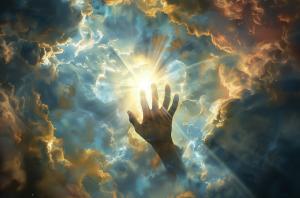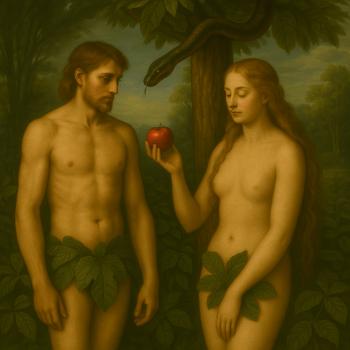Today, fewer people imagine Ultimate Reality in purely personal terms or in purely supernatural terms. Increasingly, Ultimate Reality is imagined in impersonal, natural terms, such as consciousness, energy or love.
In a previous post, I discussed the absolute and relative aspects, as well as the personal and impersonal aspects, of Ultimate Reality. Also, I suggested that those who encounter Brahman, God, the Universe, or the Void might be describing the same experience.
How can we experience fullness (Brahman) and emptiness (the Void) and equate these two seemingly-opposite experiences? Imagine that you zoom out for a “God’s-eye view,” and you can see the fullness of the universe, creation and destruction, sound and light and matter.
At the same time, you can see the emptiness of the universe, everything is nothing, just darkness and silence and space.

Natural and Supernatural
The absolute and relative aspects of Ultimate Reality apply across many traditions, whether Ultimate Reality is personal and/or supernatural. To say that Ultimate Reality is natural means that it is explained by biology, chemistry, and physics. But, we may not (yet?) understand it.
I hesitate to say that things that we do not understand are supernatural. The ancients believed that thunder and lightning were supernatural. Aristotle attributed many biological functions to the soul. Now, we have natural explanations for them (and no proof that the soul exists.)
Some Western religions cannot easily imagine God as impersonal. But, many Eastern religions can easily imagine God as impersonal. In my book, The Way, I ask whether it is possible to imagine God as the architecture of the universe, rather than the architect of the universe.
Some atheists have mystical experiences, without believing in a personal God and without believing that the experience is supernatural. Abraham Maslow, an atheist, wrote books about mystical (or peak) experiences and about interconnectedness or self-transcendence.
Everything is Consciousness
Philosopher David Chalmers writes, “Consciousness poses the most baffling problems in the science of mind. There is nothing that we know more intimately than conscious experience, but there is nothing that is harder to explain.”
In the West, many people believe that matter produces consciousness. Chalmers poses the “hard problem,” namely how something material, like an organism, could produce something immaterial, like a thought.
In the East, many people believe that consciousness produces matter. The Hindu tradition describes Brahman or Ultimate Reality as satchitananda or being-consciousness-bliss. Another hard problem is how something immaterial could produce something material.
There is an emerging intersection of religion and science. Some modern physicists see parallels between the findings of quantum physics and the writings of the ancients Hindu sages in the Upanishads and the Vedas.
Sir James Jeans, an astrophysicist, wrote, “The universe begins to look more like a great thought than like a great machine.”
Derrick Day, my fellow Patheos blogger, recently wrote a post describing consciousness as “sentient energy,” uniting two contemporary, impersonal notions of Ultimate Reality, namely consciousness and energy.
Everything is Energy
Clayton Crockett, a radical theologian, wrote a groundbreaking book called Energy and Change: A New Materialist Cosmotheology. Crockett argues that change is foundational to material reality, which is ceaselessly self-organizing.
We can observe energy’s effects in the operations of natural selection as well as those at work in human societies. Ultimately, Crockett argues, we can conceive of God neither as a deity nor as a being but as the principle of change.
I had a remarkable experience in a Native American sweat lodge. During the ceremony, one of the participants had a vision of a white wolf. To her, the wolf reflected her lone nature, and the white color reflected her desire for clarity and purity.
“Everything is energy,” the shaman explained, “and we all perceive the energy differently.”
The typical mystical experience is impersonal. But, if we see the impersonal experience in personal terms, we see what we expect to see. So, in a church, we might see Jesus, and in a sweat lodge, we might see a wolf. Not many Christians see wolves; not many shamans see Jesus.
Everything is Love
In The Universe is a Green Dragon, cosmologist Brian Swimme suggests that the universe is held together by attraction, meaning “gravity” in the physical sense and “love” in the non-physical sense. This is consistent with the findings of scientists and mystics, respectively.
When we say “love,” most of us think of personal love or romantic love, like the love for a child or the love for a spouse. But, in a higher sense, love is impersonal, pure, unconditional. “Love your neighbor as yourself” is not contingent or partial or prejudicial.
You might be thinking that impersonal love sounds cold and distant and that things improve when we get our heads and hearts involved. Sure, if our heads are clear and our hearts are pure, then things improve, but often, our heads are not clear and our hearts are not pure.
Can we be more loving if we “wipe the slate clean” when we encounter others? Can we meet them without conditions or preconceptions?
Today, fewer people imagine Ultimate Reality in purely personal terms or in purely supernatural terms. Increasingly, Ultimate Reality is imagined in impersonal, natural terms, such as consciousness, energy or love. Does this understanding foster compassion and wisdom?
If you want to stay up to date on the latest from You Might Be Right, simply subscribe with your email.














